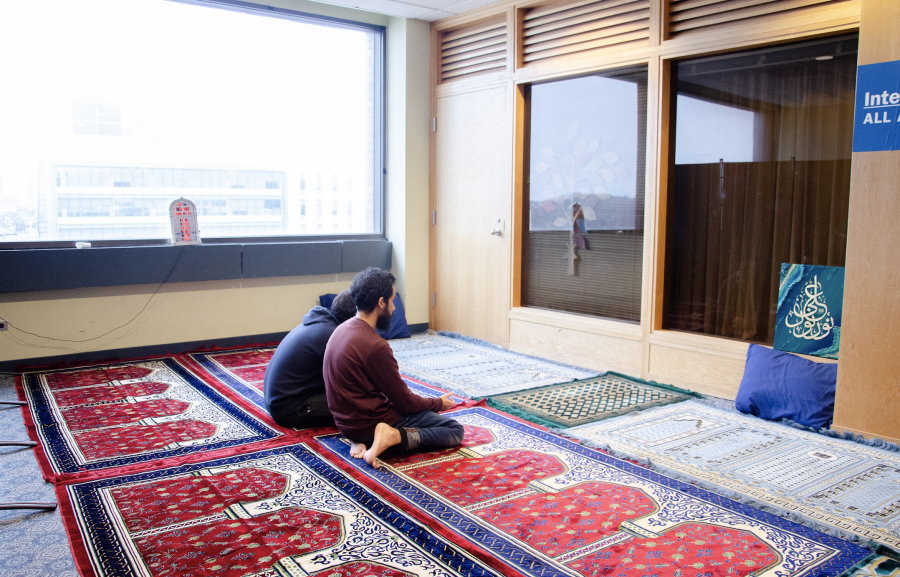With days of fasting, gathering and praying in the Ryan Lounge March 23, Muslim students, faculty and staff commenced the holy month of Ramadan.
Ramadan—the ninth month of the Muslim calendar—is regarded as one of the most pious months of the year. Muslims worldwide fast from dawn to dusk this month and consider it a period of intense introspection and connection with God and the faith. Special emphasis is given to prayers, reciting Quran, charity and being compassionate and patient.
College students confront a different schedule shift with classes, work and observing the month of Ramadan. In addition, students living on campus in dorms face several logistical problems, like the inaccessibility of breakfast at 4 a.m. and dinner meals after traditional dining hall hours.
Other difficulties students face include class timing and exam schedules conflicting with the prayer timings. Observing the month of Ramadan on campus carries different layers of problems for student-athletes.
Students on campus involved with several clubs, like Muslim Students Association and Pakistani Students Association, gave their input on the services and accommodation provided by the on-campus dining services and the university at large. Ahsan Khan, a sophomore studying business analytics, said that scheduling is one of the biggest challenges for students living on campus. Many commuter students observing the month of Ramadan need to eat and pray timelier, and sometimes even miss the prayer timings while on campus.
To address some of the challenges concerning Muslim students on campus, Khan and his friends met with Chancellor Marcelo Suárez-Orozco. Some essential points they discussed include having access to the Interfaith Center and prayer area of Ryan Lounge in McCormack for extended hours, prolonging dining hours at the dining commons, having more halal food options and making the UMass Boston community more aware of the month’s importance to accommodate their needs.
Presently, the dining commons provide adjusted dining hours for fasting students. This gives students living on and off campus the flexibility to eat hot meals even after the usual dining hours and enough time to pray after breaking the fast. Students interested had to pre-register with the housing entity to avail of the dining accommodations. The takeaway box option is also available to students who plan to store food overnight for early morning breakfast.
Kaif Khalifa, a computer science major and president of the Muslim Students Association, said that with the growing Muslim student population at UMass Boston, there is a strong need for a bigger prayer room on campus, potentially in the Campus Center, to make it more accessible to students.
In Khan’s opinion, students are taking advantage of the improved services and accommodations provided by the university, especially the adjusted dining hours, food options and takeaway box facility.
Student clubs like Muslim Student Association, Pakistani Student Association and many more have been instrumental in creating a sense of community on campus by organizing Iftar—the meal eaten after sundown during Ramadan—and providing Taraweeh Prayer. On Monday, April 10, MSA is hosting an Iftar Banquet with Art Auction, partnering with Islam By Touch, an organization working for the Blind community.
Grand Iftar is hosted by MSA, PSA and Somali Students Association on April 18, from 6:30 to 10:30 p.m. in the Campus Center Ballrooms. Iftar will be served, followed by prayer and Taraweeh, and students are highly encouraged to RSVP for the event.
Maham Faisal, a junior studying environmental studies and sustainability, said, “one of the most significant adjustments for me during Ramadan is a shift in schedule. Fitting everything into the schedule has been difficult, but not impossible. Professors have also been accommodating, and having friends around makes it even easier.”
Faisal also gave a shoutout to Professor Sana Haroon, associate professor of history and Asian studies at the College of Liberal Arts. According to Fasial, she was instrumental in assisting them with getting in touch with the administration to help them throughout the process.
Khan said, “Ramadan as a Muslim on the [UMass Boston] campus is a roller coaster. You feel tired and sluggish in the morning, but as the day progresses, you get settled. You have more time to do work and get things done. But important of all, community members coming together is a big part of Ramadan. You see students gathering for prayers and Iftar, and it really sparks a feeling of community.”

